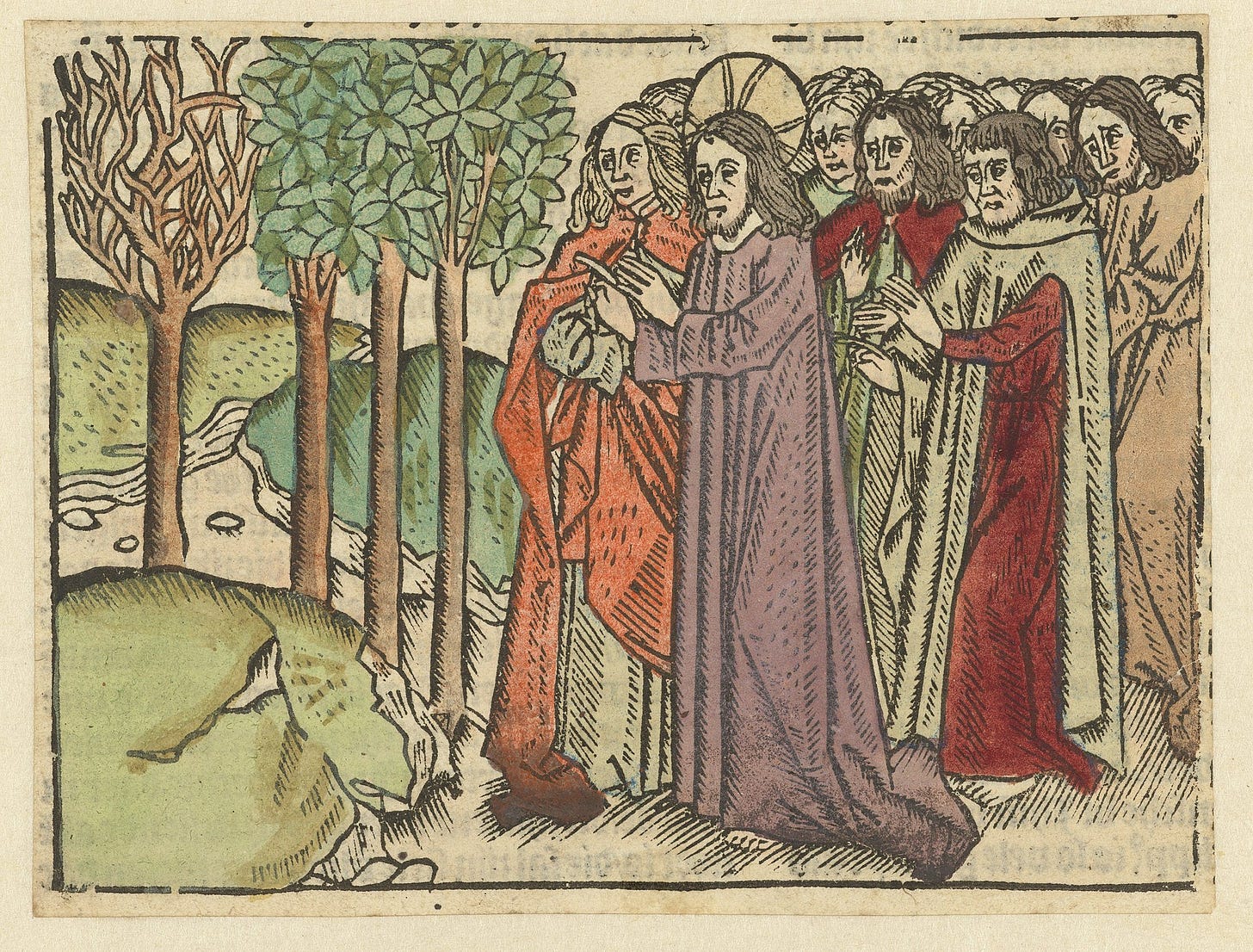The Miracles of Jesus Part 35: The Withering of the Fig Tree
Matthew 21: 18-22, Matthew 21:42-44, Mark 12-14, 20-26. Jesus pronounces His judgment on the Pharisees, Scribes, and the non-believing people of Israel, and teaches His disciples about faith.

“Now in the morning, when He was returning to the city, He became hungry. Seeing a lone fig tree by the road, He came to it and found nothing on it except leaves only; and He *said to it, “No longer shall there ever be any fruit from you.” And at once the fig tree withered. Seeing this, the disciples were amazed and asked, “How did the fig tree wither all at once?” And Jesus answered and said to them, “Truly I say to you, if you have faith and do not doubt, you will not only do what was done to the fig tree, but even if you say to this mountain, ‘Be taken up and cast into the sea,’ it will happen. And all things you ask in prayer, believing, you will receive.””
Matthew 21:18-22 NASB1995
“On the next day, when they had left Bethany, He became hungry. Seeing at a distance a fig tree in leaf, He went to see if perhaps He would find anything on it; and when He came to it, He found nothing but leaves, for it was not the season for figs. He said to it, “May no one ever eat fruit from you again!” And His disciples were listening.
…
As they were passing by in the morning, they saw the fig tree withered from the roots up. Being reminded, Peter *said to Him, “Rabbi, look, the fig tree which You cursed has withered.” And Jesus *answered saying to them, “Have faith in God. Truly I say to you, whoever says to this mountain, ‘Be taken up and cast into the sea,’ and does not doubt in his heart, but believes that what he says is going to happen, it will be granted him. Therefore I say to you, all things for which you pray and ask, believe that you have received them, and they will be granted you. Whenever you stand praying, forgive, if you have anything against anyone, so that your Father who is in heaven will also forgive you your transgressions. [But if you do not forgive, neither will your Father who is in heaven forgive your transgressions.”]”
Mark 11:12-14, 20-26 NASB1995
Jesus has made His triumphal entry into Jerusalem on Palm Sunday (Passover Week). He is staying in Bethany nearby and coming into the city each day. This miracle is rather strange, involving the destruction of a fig tree that had no fruit. A casual observer might think that Jesus was in quite a mood that day with some of the events that happened, but believers know that He never did anything without a real lesson associated with it, including things that may be perceived to be in anger. The only other miracle that resulted in the destruction of something was the casting of the demon into the herd of swine (the demon then destroys the animals).
In the Matthew chronology, Jesus purges the moneychangers and vendors from the temple and He also heals the blind and the lame near the temple (I’m not sure why the official chronologies of miracles don’t report these healings, but it is certain that He healed thousands of people during His ministry, with most of them done in groups or not documented in the Gospels). The Pharisees and Scribes are indignant about His actions. One morning (probably the next morning) coming into the city, He is hungry and sees a lone fig tree by the road. The tree has beautiful, waxy green leaves but no fruit; the Lord addresses the tree, saying that “no longer shall there be any fruit from you”. The tree immediately withers in front of Him and the disciples. Jesus uses the miracle to talk about the power of prayer for believers. Afterwards, He teaches in the temple and and His authority is challenged.
In the Mark chronology, Jesus is hungry and sees the tree without fruit (it was out of season) and says “May no one ever eat fruit from you again!” The disciples are listening. In the interim, He purges the temple of the moneychangers and vendors, angering the Pharisees. The group retreats to Bethany. The next morning they pass by the tree, which is now totally withered and dead and Peter reminds Jesus of His words to the tree. Jesus uses the example of the tree to talk to His disciples about faith and the power of prayer. Afterwards, He teaches in the temple and His authority is challenged.
Fig trees have been cultivated since ancient times and are native to regions of the Mediterranean and Asia, although they grow in many places now. Their prominence in the Bible is known and a fig tree is a representation of Israel. Adam and Eve used fig leaves to cover their nakedness after eating the forbidden fruit, and many scholars believe that it was a fig-like fruit that resulted in the first sin. By cursing the fig tree and throwing out the moneychangers and vendors at the temple, Jesus is denouncing the way the people worship and the nation that has rejected Him, the cornerstone. In fact, later in that same chapter of Matthew, He says this to the Pharisees and Scribes:
“Jesus *said to them, “Did you never read in the Scriptures,
‘The stone which the builders rejected, This became the chief corner stone; This came about from the Lord, And it is marvelous in our eyes’?
Therefore I say to you, the kingdom of God will be taken away from you and given to a people, producing the fruit of it. And he who falls on this stone will be broken to pieces; but on whomever it falls, it will scatter him like dust.””
Matthew 21:42-44 NASB1995
Here’s a great explanation of this parable done as a physical act (miracle) from Gotquestions:
The presence of a fruitful fig tree was considered to be a symbol of blessing and prosperity for the nation of Israel. Likewise, the absence or death of a fig tree would symbolize judgment and rejection. Symbolically, the fig tree represented the spiritual deadness of Israel, who while very religious outwardly with all the sacrifices and ceremonies, were spiritually barren because of their sins. By cleansing the Temple and cursing the fig tree, causing it to wither and die, Jesus was pronouncing His coming judgment of Israel and demonstrating His power to carry it out. It also teaches the principle that religious profession and observance are not enough to guarantee salvation, unless there is the fruit of genuine salvation evidenced in the life of the person. James would later echo this truth when he wrote that “faith without works is dead” (James 2:26). The lesson of the fig tree is that we should bear spiritual fruit (Galatians 5:22-23), not just give an appearance of religiosity. God judges fruitlessness, and expects that those who have a relationship with Him will “bear much fruit” (John 15:5-8).
Carefully observing all of the accoutrements of a religious life bears no fruit if the evidence of genuine salvation is not seen in a person. You can repeat liturgies and prayers and sing hymns all day, but as the redeemed we should all bear spiritual fruit and strive for righteousness and sanctification. I’m not arguing that works are required for salvation (they are not), but the believer will naturally bear much fruit (works) in serving the Kingdom every day, not just on Sundays.
Besides the lessons for the obstinate religious leaders, Jesus teaches His disciples about faith and the power they have by believing in God. Commentary by David Guzik from Enduring Word for the passages in Mark have these points to make:
Have faith in God: Jesus explained that this miracle was really the result of a prayer made in faith, and He encouraged His marveling disciples to have this kind of faith, trusting that God would hear them also.
In God: Jesus made it clear that prayer must be offered in faith, and faith must be in God. Faith is trust, confidence, and reliance upon someone or something.
…
Whoever says to this mountain, “Be removed”: Mountain was a popular figure of speech for any insurmountable problem; Jesus said that as we believe, God could overcome any obstacle.
“The phrase about removing mountains was a quite common Jewish phrase. It was a regular, vivid phrase for removing difficulties.” (William Barclay)
This promise of God’s answer to the prayer made in faith was made to disciples, not to the multitude. “Nor should we interpret Mark 11:24 to mean, ‘If you pray hard enough and really believe, God is obligated to answer your prayer no matter what you ask.’ That kind of faith is not faith in God; rather it is nothing but faith in faith, or faith in feelings.” (Warren Wiersbe)
The answers to prayers are aligned with God’s plans and commands for His believers. Praying to win the lottery by promising to pledge a large amount of the winnings to a church is not a serious prayer. Praying for your friend to overcome cancer through the healing power of God is a mountain that can be moved. None of this power can be accessed, by the way, if you have not forgiven those who have transgressed against you and also repented of your sins.
So what did we learn from this miracle?
Jesus curses a fruitless fig tree: Jesus has pronounced His judgment on the religious leaders and their practices through the temple purging and the cursing of a fig tree that had no fruit. He has power over nature and teaches His disciples about faith that can move mountains.
My next devotional examines a miracle that is documented in Luke, where Jesus heals the severed ear of one of the servants who came to arrest Him. There is one more miracle after that in the official chronologies, which is a second miraculous catch of fish in Galilee after the Resurrection (documented in John). Finally, I will summarize what we learned exploring these marvelous signs and wonders and will include the complete list as an appendix. Tentatively, my next devotional series after this will examine Psalm 8, a personal favorite.
Heaven on Wheels Daily Prayer:
Dear Lord - Please guide and sustain my faith to move mountains as I serve you. May we never forget the lesson of the fig tree that did not bear fruit. Amen.
Scripture quotations taken from the (NASB®) New American Standard Bible®, Copyright © 1960, 1971, 1977, 1995, 2020 by The Lockman Foundation. Used by permission. All rights reserved. lockman.org
Commentary from Enduring Word by David Guzik is used with written permission.
Gotquestions.org is an on-line Bible answer site operated by Got Questions Ministry.



